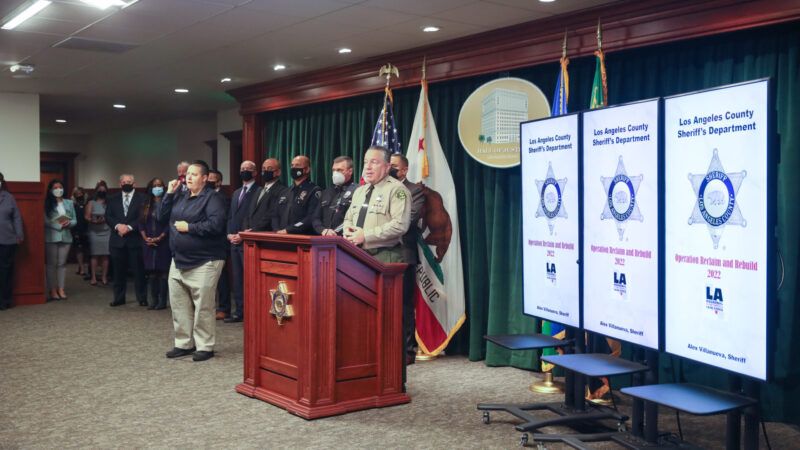214 Sex Workers Arrested in Super Bowl 'Human Trafficking' Mission
In addition, 201 "sex buyers" were arrested.

More than 200 sex workers were arrested as part of an operation that police have billed as an attempt to save people from human trafficking. The arrests—part of a Super Bowl-adjacent collaboration between Los Angeles law enforcement and the feds—represent an all too common theme in U.S. law enforcement, where people claim to be helping sex workers while actually subjecting them to harm.
The Los Angeles County Sheriff's Department (LASD) took the lead on this round of sex worker arrests, which they have christened with the creepy name "Operation Reclaim and Rebuild." LASD was joined by "more than 80 participating federal, state, and local law enforcement agencies, and task forces from across California," a press release from the department states. These included the FBI and Homeland Security Investigations.
On February 15, Los Angeles County Sheriff Alex Villanueva held a press conference to brag about Operation Reclaim and Rebuild, an annual operation that's now in its seventh year. Villaneueva was joined by representatives of the FBI, Homeland Security Investigations, and the National Center on Sexual Exploitation—a conservative values group formerly known as Morality in Media which aims to eradicate all sex work.
Over the course of one week, police carried out Operation Reclaim and Rebuild around the state of California. Their claimed mission was "combating human trafficking."
But the vast majority of those arrested were people attempting to engage in consensual prostitution, according to data released by LASD. At the end of the week, 214 people were arrested for allegedly selling sex and 201 people were arrested for allegedly trying to pay for sex.
Meanwhile, the LASD data says only 53 people were arrested for pimping, pandering, or supervising prostitution. And it's unclear if any of these individuals were engaged in anything that we might think of as abusive or non-consensual behavior—aka sex trafficking. Charges such as pimping and pandering are routinely applied to people sex workers willingly contract with to find customers, serve as bodyguards, drive them to appointments, or place ads; if two sex workers are working together and one drives or places the ad, that person might be considered a pimp. The charge doesn't necessarily mean someone has been exploitative or violent.
Villanueva said at yesterday's press conference that "30 suspected traffickers and exploiters were arrested," which still doesn't provide much real information. (How is "exploiter" defined? Will anyone actually be charged with human trafficking?)
None of this has stopped headlines from announcing the results of Operation Reclaim and Rebuild in a way that implies police found massive amounts of human trafficking—a crime that by definition involves force, fraud, coercion, or minors. ("Nearly 500 arrested in statewide human trafficking operation," asserts the Los Angeles Times headline.)
In reality, most of the arrests—445—were for misdemeanors. According to an LASD data tables, 415 of the arrests involved misdemeanor prostitution, loitering for prostitution, or escorting without a license suspicions, and 15 involved allegations of supervising prostitution. Eleven involved other misdemeanors not related to sex.
Just 49 arrests involved felony allegations. Eight of these were not related to human trafficking or sex, seven involved unspecified sexual felonies related to a minor, and 34 involved either human trafficking, pimping, or pandering. (The report does not break down that last category, despite the differing implications in each charge.)
You can find a full breakdown of Operation Reclaim and Rebuild arrests and "rescues" here. Most of the people counted as rescues—74—were adults, while 8 were minors.
What police mean by "rescues" is not specified. In many operations like these, sex workers who say they were working under duress are able to avoid prostitution charges, which might incentivize people to falsely tell police they are victims. Sometimes anyone who accepts an offer to speak to social services is tallied as a rescue, even though this doesn't necessarily mean they were being victimized.
And, of course, some of these rescues may indeed be victims of forced prostitution, in need of help from law enforcement. It's just not clear why these people couldn't be helped without arresting hundreds of people for unrelated crimes.



Show Comments (69)